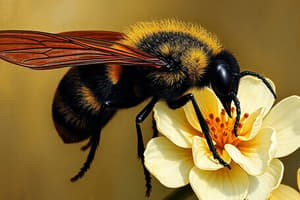Podcast
Questions and Answers
What is agricultural entomology primarily concerned with?
What is agricultural entomology primarily concerned with?
- Insects and their impact on agriculture (correct)
- Weather patterns affecting crop yield
- Plant genetics and modification
- The study of soil health
Which method is included in Integrated Pest Management (IPM) strategies?
Which method is included in Integrated Pest Management (IPM) strategies?
- Only chemical controls
- Only biological methods
- Cultural control methods (correct)
- None of the above
What role do pollinators play in crop production?
What role do pollinators play in crop production?
- They compete with plants for nutrients
- They help control pest populations
- They assist in crop pollination (correct)
- They increase agricultural pests
What is a significant challenge in agricultural entomology related to pest management?
What is a significant challenge in agricultural entomology related to pest management?
Which of the following is a current trend in agricultural entomology?
Which of the following is a current trend in agricultural entomology?
Flashcards are hidden until you start studying
Study Notes
Definition
- Agricultural entomology is the study of insects and their impact on agriculture.
Key Areas of Focus
-
Insect Identification
- Understanding morphology and life cycles.
- Distinguishing beneficial insects from pests.
-
Pest Management
- Integrated Pest Management (IPM) strategies.
- Chemical, biological, and cultural control methods.
- Importance of monitoring and threshold levels.
-
Beneficial Insects
- Role of pollinators (e.g., bees, butterflies) in crop production.
- Natural enemies (predators and parasitoids) that help control pest populations.
-
Insect-Plant Interactions
- Feeding habits and types of damage caused to crops.
- Mechanisms of plant defense against insect herbivores.
-
Insect Behavior
- Foraging behavior and host selection.
- Reproductive strategies and life cycles.
-
Economic Impact
- Assessment of crop losses due to pest infestations.
- Cost-benefit analysis of pest management strategies.
Research Methods
- Field studies to observe insect populations and behavior.
- Laboratory experiments to test pest control methods.
- Surveying agricultural practices and pest management efficiency.
Current Trends
- Use of precision agriculture and technology in pest monitoring.
- Biopesticides and sustainable practices gaining popularity.
- Genetic modification for pest resistance in crops.
Challenges
- Resistance development in pest populations to chemical controls.
- Climate change effects on insect populations and agricultural practices.
- Balancing biodiversity conservation with agricultural productivity.
Definition
- Agricultural entomology focuses on insects and their effects on farming systems.
Key Areas of Focus
-
Insect Identification:
- Involves studying insect morphology and life cycles to differentiate beneficial insects from harmful pests.
-
Pest Management:
- Employs Integrated Pest Management (IPM) techniques combining chemical, biological, and cultural controls, emphasizing the significance of monitoring pest populations and establishing threshold levels for intervention.
-
Beneficial Insects:
- Highlights the importance of pollinators, such as bees and butterflies, in enhancing crop production and features natural enemies (predators and parasitoids) that naturally regulate pest numbers.
-
Insect-Plant Interactions:
- Examines how insects feed on plants, the types of damage inflicted on crops, and the various plant defense mechanisms against insect herbivores.
-
Insect Behavior:
- Studies foraging behavior, host selection, reproductive strategies, and life cycle patterns of various insect species.
-
Economic Impact:
- Analyzes the financial consequences of pest infestations, including crop losses, and conducts cost-benefit evaluations of different pest management strategies.
Research Methods
- Conducts field studies to monitor insect populations and behaviors in natural settings.
- Performs laboratory experiments to explore the efficacy of pest control methods.
- Surveys agricultural practices to assess the efficiency of pest management approaches.
Current Trends
- Adopts precision agriculture techniques and technology for enhanced pest monitoring processes.
- Increases the popularity of biopesticides and sustainable agricultural practices.
- Explores genetic modifications in crops for enhanced resistance against pests.
Challenges
- Faces the issue of pest populations developing resistance to chemical pesticides.
- Considers climate change impacts on insect demographics and agricultural methodologies.
- Works toward achieving a balance between conserving biodiversity and maintaining agricultural productivity.
Studying That Suits You
Use AI to generate personalized quizzes and flashcards to suit your learning preferences.




